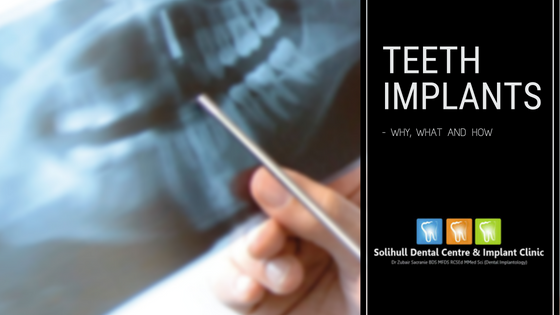 Lots of patients are asking about dental implants and trying to discover whether implants are right for them or not. With so many questions we thought we would attempt to answer a few with our dedicated teeth implant blog post.
Lots of patients are asking about dental implants and trying to discover whether implants are right for them or not. With so many questions we thought we would attempt to answer a few with our dedicated teeth implant blog post.
Many people talk about teeth or tooth implants, in this post we will refer interchangeably between the term tooth implants and dental implants, these are different terms describing the same thing.
Why do dentists prefer dental implants?
- Dental implants can help to stabilise surrounding teeth either side of the gap. They prevent adjacent teeth tipping into the gap and opposing teeth over erupting. Both of these issues can cause problems with your bite which can lead to eating problems and/or headaches.
- Implants can stabilise the bone around the socket where the tooth has been removed. When a tooth is lost the bone around the hole collapses, this can lead to problems in later life.
- Dental implants don’t require reduction of the adjacent teeth similar to dental bridges, they are therefore less invasive on the surrounding dentition.
- When the cost is calculated over your lifetime dental implants often work out at the cheapest option as they involve fewer teeth to replace the missing tooth, unlike dental bridges.
How much does a full set of teeth implants cost?
It really depends on exactly how many implants you have placed and whether you need/want a removable denture or a fixed bridge. If you have lost lots of bone you may find that you need to have a removable denture with replacement gum to bulk out your lips, this can give a more youthful appearance and replace lost bone/gum.
- A full denture held in by 2 dental implants will typically cost from £3500.
- A fixed full arch bridge retained on dentures typically costs from £9000.
Further information about the cost of dentistry in the UK can be found on our blog.
Are dental implants painful to have done?
On the whole, no. The treatment is usually carried out under local anaesthetic only, immediately after the tooth implant placement you may need to take prescription painkillers to keep yourself more comfortable. For the first couple of weeks after implants you may find there is some discomfort as the soft tissue heals.
How long do dental implants last for?
The dental implant itself (the part which is under your gum and in the bone) can easily last a lifetime. The only part of a dental implant which may need to be replaced is the part that you see, this will either be a dental crown, bridge or denture. The typical life of a dental crown or bridge is around 10 to 15 years, although many people have dental crowns which last a lifetime.
The key to ensuring a dental implant lasts for the longest amount of time is a good dental hygiene and regular maintenance. This includes good oral hygiene at home as well is regular visits to the dentist.
Can a dental implant fall out?
A dental implant is made of several different components, primarily this consists of the dental implants itself (the part which is under your gum and in the bone), the dental crowns/bridge/denture (The part which you see) and the abutment (The part which connects the underlying dental implant to the restoration that you see).
Generally speaking the dental implant itself will be so securely retained within your mouth that it won’t fall out, there is however a rare condition called peri-implantitis which can occur if the bone around the implant becomes infected. If this happens it is possible for the implant itself to fall out.
The most common reason you may think a dental implant has fallen out is that the dental crowns/bridge/denture becomes loose or falls out. This is not the same as the implant falling out itself. If the crown/bridge/denture falls out it is usually a simple process to replace it by visiting the dentist.
Do you have to have an anaesthetic for dental implants?
You will always be given a local anaesthetic for dental implants. You can also opt for sedation with dental implants in some cases. Rarely with the dental implants be placed under full general anaesthetic. The process is relatively quick, simple and these benefits outweigh the risk of a general anaesthetic.
What are the downsides of dental implants?
Dental implants have very few downsides, they need to be looked after the same as your natural teeth do and if you do this they will serve you well for many years. Many people believe that the cost of dental implants is a big downside, the cost of implants can be quite high initially but when taken into consideration that implants can last a lifetime it makes the upfront cost very high value.
This blog post has been written by Solihull Dental Centre and Implant Clinic, download a voucher now for a low-cost dental implant initial consultation saving you 70% off the usual treatment rate.
Zubair Sacranie
Latest posts by Zubair Sacranie (see all)
- Dental Implant Problems: What’s The Worst That Can Happen? - 30th March, 2024
- Dental Implants – Frequently Asked Questions - 28th January, 2024
- Beyond Dental Bridges – Are Implants The Right Choice For You? - 26th August, 2022


